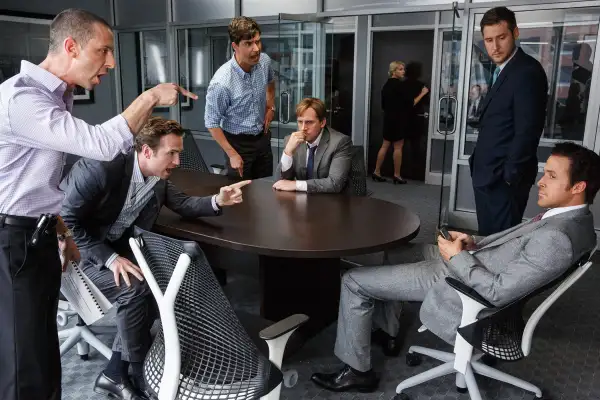Is the Shady Stuff From "The Big Short" Era Still Going On?
Money is not a client of any investment adviser featured on this page. The information provided on this page is for educational purposes only and is not intended as investment advice. Money does not offer advisory services.

The Big Short, the movie adaptation of Michael Lewis's book about the people who successfully bet that the housing bubble would pop, has been crushing at the box office despite limited release, reigniting outrage over the shady, unethical, and downright illegal activities of America's most notorious street in lower Manhattan. It hit theaters nationwide on December 23, in time for the holiday weekend.
If you're unfamiliar with the backstory, the gist of the unsavory activities that led to the housing crisis was threefold: lenders handing out risky (subprime) mortgages to borrowers with poor credit scores; banks bundling these subprime mortgages into securities and treating them as if they weren't risky at all; and banks and insurers issuing insurance policies against the system's implosion. Here's a full primer with what you should know before you see the movie.
But after you enjoy the skill with which Hollywood turned this dark episode into a thrilling entertainment, you might start to wonder: Is all the risky Wall Street behavior that led to the crisis still going on? The answer, in most cases, is no—but that doesn't mean something similar can't happen again. Here's a quick look at the good news and the bad.
CDOs are dead
Let's start with the good news: So-called "collateralized debt obligations" are dead. Pre-crisis, investors were gorging on these bundles of residential mortgages—or, to be more precise, bundles of bundles of mortgages. And now CDOs are gone. "These particular instruments of mass destruction, as Warren Buffet called them, no longer exist," says Susan Wachter, a real estate and finance professor at the Wharton School who foresaw and warned about the looming disaster well before the collapse happened.
Similar financial devices are still around, including private label CMBSs (commercial mortgage-backed securities) and CLOs (CDOs with regular bank loans instead of mortgages). But Wachter says they're not as dangerous because the Dodd-Frank Wall Street Reform and Consumer Protection Act prevents people from issuing these securities to hedge or transfer all the risk. "They’re basically not a problem at this point," she explains. "They are exposed to the risk and well incentivized."
The mortgage business is being more careful—for now
If you've tried to get a mortgage, you probably know this already: In stark contrast to a few years ago, when anyone with a pulse could get a mortgage, it's pretty hard to get one these days. In short, grossly irresponsible mortgage lending appears to have been curbed. "The credit quality and the production quality of loans is far better," says Wachter.
In addition to all the regulations imposed by Dodd-Frank, the banks have imposed their own internal incentives to lend responsibly. "They’re overlaying their own underwriting standards that are above the requirements of Fannie and Freddie and FHA, so the book of business is excellent," says Wachter. "Foreclosures and delinquencies are down. And there’s no private-label mortgage-backed securities to speak of that are coming in and undermining the market."
Ratings agencies are behaving better, but still conflicted
What about grabbing a handful of janky mortages and slapping really good ratings on them? The credit ratings agencies were tarred and feathered for this practice post-crisis, culminating with Department of Justice investigations and settlements. Standard & Poor’s was hit with a $1.375 billion settlement but didn't admit to doing anything wrong.
Pretty much immediately, regulations were proposed by the SEC calling for the credit ratings agencies to actually look at the underlying assets in asset-backed securities so abysmal stuff bundled together wouldn't get rebranded as quality merchandise. The SEC and Dodd-Frank buttoned up the wide-open holes where conflicts of interest thrived, making sure that people who assigned ratings weren't involved in selling or marketing the stuff being rated. The SEC also enacted rules requiring the disclosure of relevant third-party information and started "look-back" review procedures to determine whether favorable ratings from the agencies were being required by issuers as a quid pro quo for future engagements.
However, as the Council on Foreign Relations notes, there are still only three major ratings agencies and they all use an "issuer pays" fee structure—a built-in incentive for the agencies to deliver favorable ratings. As the S&P employee played by Melissa Leo says in The Big Short: "They'll just go to Moody's."
The next crisis won't look the same as the last one
Can another Big Short happen? Well, not in the same way. For one thing, the complex insurance products that The Big Short guys used to bet against the housing market—so-called credit default swaps—are dead, too.
That's a good thing. But Wachter is now concerned that the solution to the crisis generated the seeds of another. Essentially, she argues, the government nationalized the entire residential mortgage market, handing the reins to Fannie Mae, Freddie Mac, and the Federal Housing Authority. Although these entities don't make dangerous CDOs, and you can't buy credit default swaps from them, our reliance on them leaves the economy vulnerable.
"We’ve nationalized a system that isn’t supposed to be nationalized and that is not sustainable," Wachter says. "Next time it’s gonna be a different story: It’s not gonna be CDSs and CDOs which take us down. It's what we put in their place that exposes us."